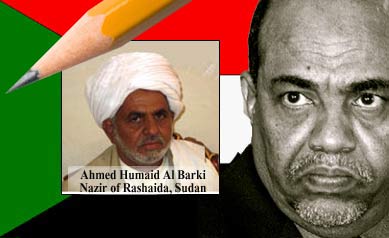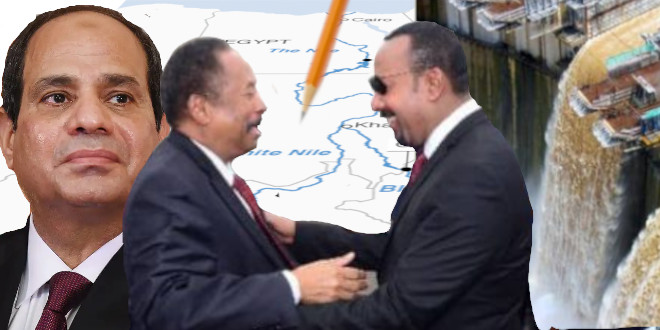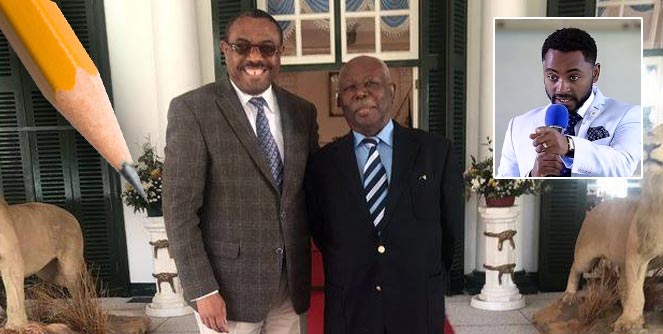Who Will Speak for the Voiceless Eritreans In Sudan?

The December 24 attack on Eritreans at the Shagarab refugee camp in Sudan, when criminal elements of the Rashaida, in collaboration with Sudanese security officials, assaulted, molested, kidnapped Eritreans and torched their huts, is not the first incident and, sadly, won’t be the last incident unless they find a protector. There are four parties that should, but have failed, to protect them: the Sudanese government, the Eritrean government, the International community and, lastly, the Eritrean opposition. This Pencil will focus on what we, in the Opposition, can do to ensure that this type of assault does not occur to our fellow compatriots in Sudan or anywhere in the world, for that matter.
Sudan
Sudan has 18 states of which three border Eritrea: Kassala, Red Sea. and Al Gadarif. These three states, which make up “Eastern Sudan” formed an armed group, the “Eastern Front,” and rebelled against the government of Sudan due to justified complaints of marginalization, extreme poverty, lack of development and power sharing by the central government. In June 2006, Asmara facilitated the “Eastern Sudan Peace Agreement”, which recognizes Sudan as a Federal Government and implements timelines for power sharing milestones. The agreement grants Khartoum authority over “national sovereignty and territorial integrity” and vests in the provinces all other powers not vested in Khartoum.
The population of Eastern Sudan is mainly a mix of Beja (Hadendawa, Halenga, Bisharin, Amrar); the Bani-Amer; Habab, and the Arab tribes. This ethnic composition was mostly reflected in the two large groups that made up the Eastern Front: the Beja Congress and the Rashaida [Arab] Free Lions. The Darfuri JEM and the Southern SPLA were part of the coalition to apply pressure on the Sudanese government and they didn’t receive anything from the “Eastern Sudan Peace Agreement.” Similarly, the Beni-Amer tribal confederation, that straddles the Sudanese-Eritrean boundary, has a large presence in Western Eritrea and in Eastern Sudan, did not benefit from the Eastern Sudan Agreement.
In the incident of December 24, as with all previous incidents involving kidnapping and human smuggling, Eritreans refer to “Arabs” as the guilty party. This most likely refers to criminal elements within the Rashaida group, newly empowered by the Eastern Sudan Peace Agreement, and tacit support from corrupt government officers from both governments.
The overhwleming majority of Eritreans who have been victimized by criminal elements of the Rashaida are Christians.
This is probably due to the tribal configuration in Eastern Sudan: every Sudanese and almost every Muslim Eritrean has a chieftain (“Nazir”) recognized by the local government of Sudan. What this means is that if a criminal from one tribe (for example: Lahawiyeen Rashaida) victimized a member of another recognized tribe (for example: an Eritrean Beja), then the family of the victim would have somebody to appeal their case to. This is not the case with Eritrean Christians and, armed with that knowledge, the criminals from the Rashaida or other Arab tribes have been victimizing them for years now.
Eritrean Government
The Eritrean government has been making one argument over and over: Eritreans who leave their country are doing so for economic reasons and have no quarrels with the Eritrean government. If that is the case, why doesn’t the Eritrean government speak on behalf of the thousands of Eritreans, its own citizens, who continue to be brutally victimized?
The fact is that Eritrean youth are leaving by the thousands because they do not see a future for themselves in Eritrea. Even if one argues that this is an “economic” reason, economy is politics. The maladministration of the Eritrean government is so pervasive that young people would rather risk death and worse than stay in their fatherland.
According to the Somalia Eritrea Monitoring Group (SEMG), the Eritrean government is not just indifferent to the predicament that Eritrean youth are facing. It is part of the conspiracy and benefits financially from the human smuggling enterprise co-ordinated by criminal elements of the Sudanese and Egyptian Rashaida rings. The criminal elements of the Rashaida are its partners in crime.
Thus, it is unsurprising that the Eritrean government would not say one word to express concern, much less take any action, to stop the abuse of its citizens. It doesn’t even use their miserable living condition as a “teaching moment” to warn its citizens about the perils of leaving Eritrea. As far as it is considered, they are just a commodity—a source of revenue when they are being smuggled; and a source of revenue when they send remittances to their families in Eritrea and, in some cases, ask for forgiveness and begin paying their “obligatory” 2% Diaspora Tax.
The International Community
Three days after the incident, the UNHCR has not issued a press release on the events of December 24. We understand that UNHCR has limited powers; and it can’t do much if the host country is frustrating its efforts. However, it has the moral bully pulpit to blow the whistle and alert the world of the suffering of Eritreans.
“Arabs-on-horseback torching huts of Black Africans” is what galvanized the world opinion of the Sudanese governments abuse of its own citizens in Darfur. This time the criminal elements torched Eritrean refugee huts, beat and kidnapped Eritreans, and will, if not stopped, traffic them. Therefore, UNHCR must alert the world: that is its responsibility.
Eritrean Opposition
Eritrean civil society and Eritrean charity groups have done admirable work in making the life of Eritreans in refugee camps more bearable. We would like to appreciate the modest work that Ethar Relief, ERIMC, ARAHA, Wad Sherife School, Kebire Relief, and other initiatives taken to support the mostly forgotten Eritrean refugees in Sudan. But as far as assertive political advocacy is concerned, the kind that would have been common during Eritrea’s armed struggle when the Fronts demonstrated, to friends and foes alike, that Eritrean civilians should not be messed with, the opposition has been severely lacking, with one glaring exception.
Five years ago, the Eritrean Liberation Front (ELF) wrote letters to President Omar Al Bashir as well as to the Minister of Interior and the local government of Kassala about the rampant acts of extortion, kidnapping and human trafficking that Eritrean refugees are subjected to. When it received no response, it identified the area where Eritreans were being held hostage by Rashaida gangs, and stormed it and freed some hostages. Khartoum, which is tasked with protecting Sudan’s sovereignty and territorial integrity, gave a strong warning to the ELF to cease and desist. The ELF wrote: “We will never accept that the children of our people whose sufferings we strive to end, to be vulnerable to coercion and extortion. And we say to these people that our people know how to defend their rights and to avenge themselves; the Eritrean Liberation Front will not keep silent and to the criminals ‘it spins back the act.’ “
This led to more discussions between the leader of the ELF, Hussein Khalifa, and the leader (Nazir) of the Rashaida, Sheikh Ahmed Humaid Al Barki. On February 5, 2010, the Nazir issued the following statement:
“We are appalled regarding what came to our knowledge, and [what we] learned from those who are directly concerned with what affects their people, that some unruly individuals belonging to the Rashaida tribe are practicing detention and kidnapping. The worst thing imaginable to Eritrean citizens, [who are] fleeing from their country for safety and a variety of reasons is, that this naughty clique commits heinous acts [on them] along the edges of the Eritrean Sudan border. At a time that the Arab Muslim Rashaida condemns and denounces such acts being committed against their sons and brothers of the people of Eritrea, it considers such childish acts not only a ruining of the safety and security of Eritreans, but the safety of the Rashaida and the general population [that lives] around the Eritrean Sudan border. It further exposes their common interests and welfare to high risks. We cannot in any way allow the absurdity of the handful of unruly individuals who do not adhere to the values of the Arab Muslim Rashaida who rescues the needy, gives security to the fearful, feeds the hungry, champions the oppressed and is a good neighbor.
.
“We the Rashaida, live in eastern Sudan and in Eritrea; we live among our brothers of the tribes of the east and [other] tribes throughout Sudan and Eritrea in peace and harmony and love. We solve the basic things that occur here or there relying on our tribal traditions and based on exalted Islamic teachings. These noble values prevent us from accepting such childish behaviors [among us]. Thus, we assure our people in Eritrea [that] our tribe will not allow this unruly criminal bunch which is devoid of conscience, in committing such blunders under [the Rashaida’s] name and in its region. We will face them with determination and decisiveness and follow all the means to stop this outrageous behavior. We assure all Eritreans that their Rashaida brethren–all their clans and branches—reject this dirty work that doesn’t befit them. We will work with the Nazir’s office to stop these despicable acts that doesn’t look like us at all and we will stand with our people in Eritrea in good times and bad.
.
“Once again, we say that the Rashaida are innocent of these heinous acts which we will uproot from our region and in all our residential areas; confirming that these unruly boys [plan] to profit from the suffering of our people in Eritrea, they do not represent the values and nobility of the Rashaida. They are unruly boys who do not imagine the weight of the responsibility of the hostilities that these acts might create and bring about the scourge to their people. With this, we repudiate these outrageous acts, and God willing, we will work aggressively to stop it and bring it to its limits.”
.
Nazir Ahmed Humaid Al Barki
Nazir of the Rashaida
That was in 2010. Four years later, a similar “wake up call” is required by Eritrean opposition organizations who are fighting to bring relief to Eritreans. If they can come together to write joint statements condemning this act, if they can take the initiative to reach out to the Nazir of the tribes of the criminal elements, and probably issue a stern warning to the criminals, then they can confidently say that they speak for and are fighting for the rights of Eritreans.
Somebody needs to speak for Eritreans in Sudan. It won’t be Sudan; it won’t be the Eritrean government; it won’t be the International Community. Therefore, it must be US, the Eritrean opposition.
awate.com
Inform. Inspire. Embolden. Reconcile.




Awate Forum